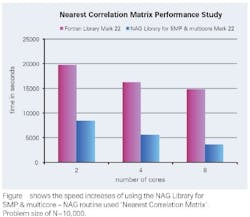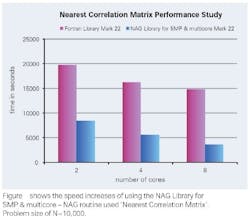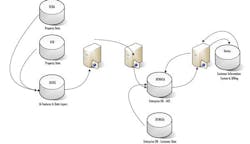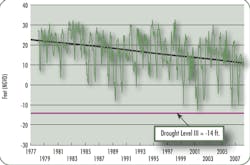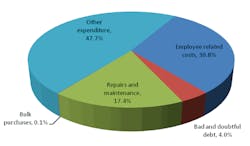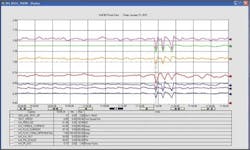Urgent upgrades required in South Africa
South African municipalities blame a lack of government funding for the deterioration of water infrastructure but studies have shown they used just over 30% of their allocated budget in 2009. Derrick Chikanga looks at the results from the report South African Municipal: 2010 Operational and Capital Expenditure Anaylsis to find out why.
South Africa's municipal water and wastewater sector currently faces numerous challenges. This is mainly due to limited financing by government, which has adversely affected the level of service delivery by municipalities with regards to water provision and wastewater treatment. The municipal water and wastewater sector is characterised by 162 Water Service Authorities (WSA) and approximately 850 municipal treatment plants. WSAs are tasked with the responsibility of ensuring the supply of clean drinking water that conforms to the drinking water quality (DWQ) standards. In 2010, the Blue Drop and Green Drop assessments were undertaken with the objective of assessing the current state of South Africa's water and wastewater quality.
According to the findings of the Blue Drop assessment, most of South Africa's water complies with the drinking water quality standards. This is evident in the fact that 55% of all municipalities that were assessed scored higher than 50%, which demonstrates a high level of compliance amongst WSAs. However, according to the Green Drop assessment the municipal wastewater treatment sector is not complying with the respective effluent quality standards and is currently considered to be in an unacceptable state. This is when compared to the required national standards and international best practices.
Only 45% of the wastewater treatment plants that were assessed complied with the required standards. It was also established that most municipalities are not managing their wastewater treatment plants according to the legislative requirements. Also, they are not in possession of management information required for Green Drop assessments - this requires urgent attention in order to remedy this situation.
Frost & Sullivan undertook the operational and capital expenditure analysis in order to determine the expenditure trends across municipalities. The main objective was to determine where South African municipalities are focusing their operational and capital expenditure within their water and wastewater departments. The study also focused on breaking out capital and operational expenditure function types for the current financial year and identifies which municipalities are optimising their allocated budgets.
Figure 5:Comparison of capital budget and actual expenditure (2009)
Research findings
The South African municipal water and wastewater sector is characterised by six metropolitan municipalities, 46 district municipalities and 231 local municipalities. These supply most of South Africa's drinking water as well as treating wastewater effluent generated. The municipal fiscal year starts in June and runs till May the following year. (hence this analysis considered the first six months of the 2009/2010 municipal financial year).
Municipalities use most of their water and wastewater operational budgets on five key elements, namely: salaries and wages; bad and doubtful debts; repairs and maintenance; bulk purchases and other expenditure items. South African metropolitan and local municipalities were allocated $3,639.5 million for their water and wastewater operational expenditure for the 2009/2010 fiscal year. In 2009 these municipalities spent $1,453 million of their total allocated operational budget (39.9%). Most of the operational budget was allocated towards the six metro municipalities of City of Johannesburg, City of Tshwane, Ekurhuleni, eThekwini, Cape Metropolitan and Nelson Mandela Bay. These accounted for 69.8% of the total operational budget in 2009. Metropolitan municipalities received most of the operational budget as they supply water and wastewater services to most of the urban population.
Most of the water operational expenditure was for bulk purchases of potable water from Water Service Providers (WSPs) as well as water treatment chemicals. Bulk purchases contributed 41.8% to the municipal operational expenditure. However, limited financial resources were allocated towards the repairs and maintenance of water and wastewater infrastructure. The main reason is that most of the potable drinking water is supplied by WSPs such as Rand Water and Umgeni Water; the two largest WSPs that supply potable water to two of South Africa's most populous provinces of Gauteng and KwaZulu-Natal. These bare most of the infrastructural maintenance expenses and recover such costs from the bulk water sales to municipalities.
Wastewater treatment criticism
South Africa's wastewater treatment plants are mostly operated by metropolitan and local municipalities. These treat on average approximately 7,589 mega litres of wastewater on a daily basis.
Recently, wastewater treatment plants have come under increased criticism for their poor state. This has been blamed on lack of funding to ensure that these municipalities are compliant with their operational license. However, it was established that other elements have also had an impact on their ability to operate, according to the required standards. Most water treatment plants, particularly those operated by local municipalities, currently experience a crippling skills shortage at all levels. This includes both managerial and junior operational levels.
The lack of relevant personnel to operate and manage wastewater treatment plants means that many plants are not operated correctly and the resultant effluent if usually not compliant. The majority of local and district municipalities barely keep any information regarding their wastewater treatment works.
This means that such municipalities do not understand the funding requirements for their wastewater treatment plants. Hence the maintenance of infrastructure is normally considered a luxury rather than a necessity by most municipalities. The extensive refurbishment as well as expansion of wastewater treatment plants is urgently needed.
In 2009 most operational expenditure for the municipal wastewater segment was directed towards other expenditure items that include the purchasing of wastewater treatment chemicals and other raw materials. However, despite the poor state of most wastewater treatment works, only 17.4% of total expenditure was for repairs and maintenance of these treatment works.
Municipal water and wastewater capital expenditure involves the construction of new treatment plants as well as network expansion and rehabilitation. In 2009 South African municipalities were allocated $1,110.2 million for their water and wastewater capital budget. These municipalities used $351.8 million of their total allocated budget in 2009 (31.7%).
Urgent upgrades
Despite the pressing need to address the lack of capacity, there is a lack of urgency on the part of municipalities. A number of wastewater treatment works are currently operating above their design capacity and this requires urgent attention with regards to expansion, upgrading and rehabilitation. Constant systems failure by wastewater treatment works need to be urgently addressed through increased capacity and provision of the required support in cases where there are consistent and regular failures.
South African municipalities have recently been placed under increased scrutiny due to their poor performance on water and wastewater service delivery. Most municipalities have justified themselves by placing the blame on poor funding from national government. For example, during the first half of the 2009/2010 fiscal year, municipalities spent 39.9% of their total water and wastewater operational budget.
Most of their allocated budget was for water-related functions, which mainly include the supply of bulk water to South African communities. However, very limited water expenditure was used for the repairs and maintenance of water infrastructure. The main reason being that in urban areas, most potable water is mainly supplied by WSPs. These recover the costs of repairs and maintenance directly from municipalities through bulk water sales.
In 2009 most municipal wastewater operational expenditure was on various expenditure functions such as the purchase of wastewater treatment chemicals. Further, only 17.4% of the total expenditure was for the repair and maintenance of infrastructure. Considering the current poor state of wastewater treatment plants, there's a need to revise municipal expenditure trends with a shift towards allocating more resources on the repair and maintenance functions. This could potentially present an opportunity for both local and foreign equipment suppliers to help assist in improving the current situation.
Moving forward
A number of municipalities, particularly district and local municipalities do not keep up-to-date information with regards to their wastewater treatment works. Such information is critical in understanding the funding requirements of wastewater treatment plants. This has resulted in poor maintenance of infrastructure.
Municipalities need to effectively take advantage of their allocated budgets in order to justify their claim of limited funding from national government. This under usage of capital budgets has placed pressure on current infrastructure in trying to meet increased demand for acceptable levels of service delivery in the water and wastewater sector.
South Africa may currently have drinking water that complies with drinking water quality regulations. And most WSAs currently operate their water treatment works according to the minimum required operational standards. However, South Africa's wastewater treatment plants require urgent attention and their current state is considered to be far from acceptable when compared to national standards and international best practices.
Author's note:Derrick Chikanga is an analyst in the South Africa Environment Team of Frost & Sullivan. For further information on the above research, please contact Chiara Carella, head of Corporate communications — Europe and Africa on email: [email protected]
More Water & WasteWater International Current Issue Articles
More Water & WasteWater International Archives Issue Articles
